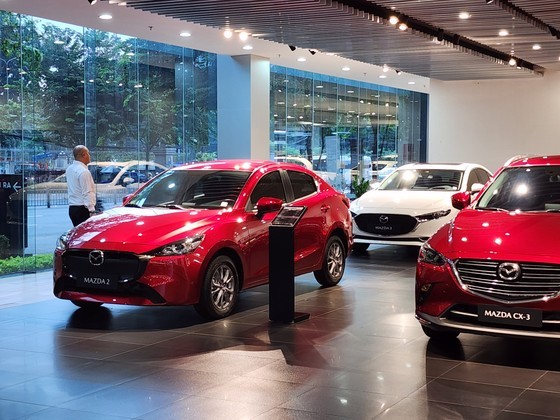 |
No customer is seen in a car showroom in HCMC |
Normally, at the end of the year, the car market will be quite good, families will buy new cars to travel during the Lunar New Year season. However, in Ho Chi Minh City, the automobile market at the end of 2023 does not follow this rule with weak sale.
The buying atmosphere in car showrooms was very quiet in Ho Chi Minh City with a few customers in the end of November. New car showrooms with large premises in An Lac Ward in Binh Tan District, Go Vap District, District 7, and District 12 have seen with few visitors. Most customers are interested in cars priced from VND600 million - VND800 million (US$24,655 – US$32,873) of Japanese and Korean brands.
According to car dealers in Ho Chi Minh City, the end of the year is very important in the new car business. Firms and dealerships accept no profit in the first months of the year with the hope that increased sales at the end of the year will help offset profits. However, this year’s purchasing power in the last months has not shown signs of recovery, so companies and agents even have to continue to promote incentives.
Mr. Tan Dat, a salesman of Mazda Tan Son Nhat showroom in Phu Nhuan District revealed that in recent months, car companies and dealers have tried all kinds of methods to stimulate demand but they are not very effective. His company is forced to push new products out sooner, with the hope of creating a boost for the new car market on the occasion of the Lunar New Year 2024.
The Vietnam Automobile Manufacturers Association (VAMA) said that in October 2023, roughly 25,369 vehicles including 19,624 passenger cars, 5,604 commercial vehicles and 141 specialized vehicles have been sold. This number is nearly equal to September 2023, but down 31 percent compared to October 2022. Passenger car sales decreased by 0.2 percent while commercial vehicles - used for commercial or business purposes increased slightly by 1 percent and specialized vehicles decreased by 14 percent against that in the previous month.
VAMA added that sales of domestically assembled cars reached 16,414 cars, down 1 percent compared to the previous month, and 8,955 completely imported cars were sold, up 2 percent compared to the previous month.
Overall, in the past 10 months, VAMA members have sold 235,296 vehicles, down 29 percent over the same period last year. VAMA said that passenger cars saw a decrease of 32 percent while commercial vehicles decreased by 16 percent and specialized vehicles decreased by 60 percent. Thus, these numbers show that the auto market has not been able to prosper even though this is the end of the year.
As schedule, in November and coming December, companies will continue to bring a series of new car models to Vietnam. For example, Hyundai will introduce a 7-seat Custin model, priced from VND1.1 billion to VND1.5 billion a car while Mitsubishi has imported a completely new SUV model Xforce, priced at about VND700 million a car and Suzuki has brought in the small SUV Jimny at an attractive price of about VND500 million per car. Meanwhile, MG car company has more hybrid models HS and MG 7 - in the same segment as Mazda 6 and Camry.
In addition, car companies also continue to run great incentive programs. Specifically, Toyota, Ford, Subaru all offer direct discounts on each car including 50 percent - 100 percent of registration fees and service cards as gifts.
Previously, the Government issued Decree No. 41/2023/ND-CP regulating registration fee rates for cars, trailers or semi-trailers pulled by cars and other types of vehicles similar to cars manufactured and assembled domestically. From July 1, 2023 to December 31, 2023, the registration fee rate is equal to 50 percent of the rate specified in the Government’s Decree No. 10/2022/ND-CP regulating registration fees. The application of the preferential policy to reduce registration fees by 50 percent for domestically assembled and produced cars this time has had a certain impact on increasing purchasing power, but sales have not been as good as expected.
According to some economic experts, car sales continue to decline sharply despite a policy of reducing registration fee by 50 percent. This shows that the economic recession is still continuing; plus, other factors such as unstable and unpredictable global economic, political and social developments in recent months have caused difficulties for consumers and businesses.
























